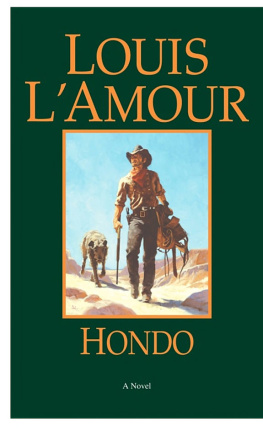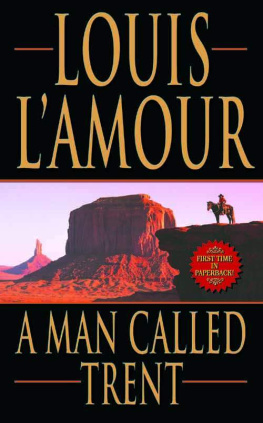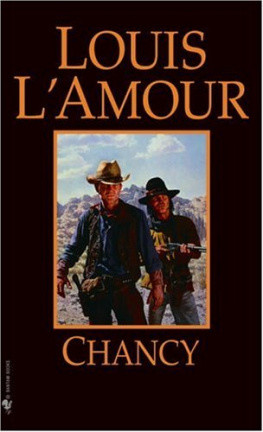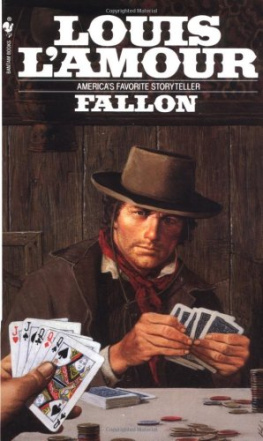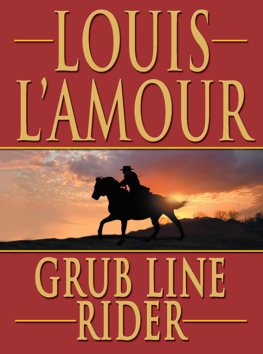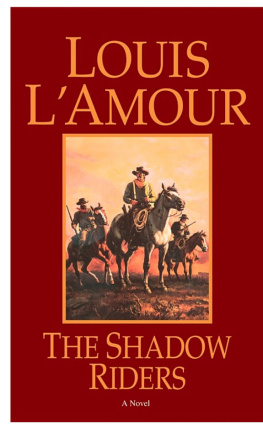Louis LAmour - Bowdries Law
Here you can read online Louis LAmour - Bowdries Law full text of the book (entire story) in english for free. Download pdf and epub, get meaning, cover and reviews about this ebook. year: 2004, publisher: Bantam, genre: Detective and thriller. Description of the work, (preface) as well as reviews are available. Best literature library LitArk.com created for fans of good reading and offers a wide selection of genres:
Romance novel
Science fiction
Adventure
Detective
Science
History
Home and family
Prose
Art
Politics
Computer
Non-fiction
Religion
Business
Children
Humor
Choose a favorite category and find really read worthwhile books. Enjoy immersion in the world of imagination, feel the emotions of the characters or learn something new for yourself, make an fascinating discovery.

- Book:Bowdries Law
- Author:
- Publisher:Bantam
- Genre:
- Year:2004
- Rating:4 / 5
- Favourites:Add to favourites
- Your mark:
- 80
- 1
- 2
- 3
- 4
- 5
Bowdries Law: summary, description and annotation
We offer to read an annotation, description, summary or preface (depends on what the author of the book "Bowdries Law" wrote himself). If you haven't found the necessary information about the book — write in the comments, we will try to find it.
Bowdries Law — read online for free the complete book (whole text) full work
Below is the text of the book, divided by pages. System saving the place of the last page read, allows you to conveniently read the book "Bowdries Law" online for free, without having to search again every time where you left off. Put a bookmark, and you can go to the page where you finished reading at any time.
Font size:
Interval:
Bookmark:
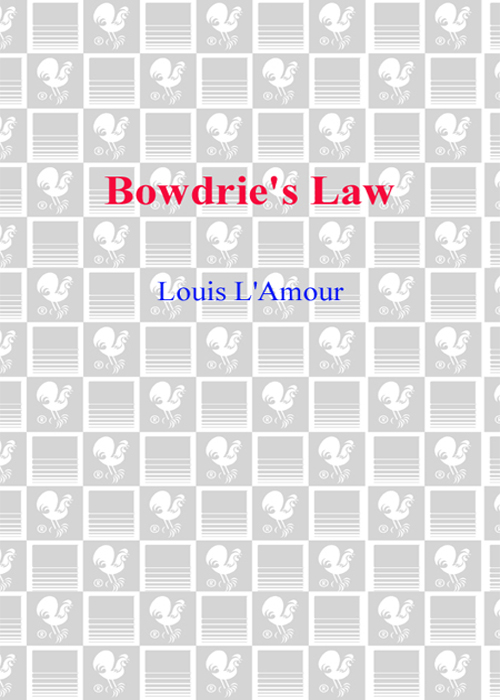
B OWDRIES
L AW
Louis LAmour
B A N T A M B O O K S
Contents
FOREWORD
WAS THE WEST really wild? Much depends on ones definition, as well as ones viewpoint. There were areas of comparative quiet, and much of the in town violence occurred in the saloons or the red-light districts. Church services, social affairs among the towns outstanding citizens, or quiet evenings at home were rarely disturbed by distant gunshots.
On the other hand, in the period between 1865 and 1892 there were 823 battles between the Indians and the Army. That says nothing about raids upon ranches, settlers homes, or the various conflicts between private citizens and the Indians. Fights such as the one told elsewhere in this book, The Buffalo Wallow Fight, would not be listed by the Army. It was simply too small to be considered a battle.
Neill Wilson, in his excellent book Treasure Express, lists a series of Wells Fargo holdups that took place in one period of 14 years. In that period there were 313 robberies of stages and 34 more were attempted. Of the robbers, 16 were killed, 7 hanged by irate citizens, and 240 convicted.
Wells Fargo was only one express company, and these were only horse-drawn stages. The above listing does not include train robberies and, of course, has nothing to say of robberies of other kinds at other places. One can safely say there was considerable criminal activity at the time.
Cattle and sheep wars were numerous, and there were feuds between families or factions, some of which lasted for years and involved pitched battles as well as numerous gunfights. In the case of the family feuds, there were some outright murders.
The Sutton-Taylor feud, the Mason County War, the Lee-Peacock affair, the Horrell-Higgins fight, the Lincoln County War, and the Graham-Tewksbury fight in the Tonto Basin of Arizona were only a few of those that actually took place, and most of the writing on the subject centers around the cattle drive period, the Texas-to-Kansas route and the action at either end. Attention is also given to Tombstone, and Deadwood gets a quick glance because of the killing there of James Butler Hickok.
The Johnson County War of 1892 was another such, although most of the killings took place before the Invaders arrived to attack Nate Champion on the KC Ranch. The movie Heavens Gate was based on this conflict, and in it the ranchers are shown riding roughshod over a bunch of Russian immigrants. Nothing could be less true. This movie is now circulating abroad, presenting a portrayal of events that has nothing to do with the truth. No Russians were involved. That is pure invention. The participants were homesteaders and ranchers, most of whom were Anglo-Saxon, Scotch or Irish on both sides. In the motion picture Nate Champion is portrayed as a gunman riding for the big cattlemen. As a matter of fact, he was the one they most wished to kill!
Of course, the West was wild. Much of it was wide open country (and much still is) where a mans life often depended on his horse. There were vast plains, then mountains, and after that desert and more mountains. It was a place where a man might lose himself, and some did. These men, however, were rarely outlaws. The latter were, despite what many may believe, usually gregarious. They did not want money to buy food, they wanted it for whiskey, women, and gambling, and this necessitated being where people were.
Very few eluded the law for long, for the money was of no use while they hid out in the hills. They had to come to town, and the towns were so small, nearly everybody knew what everybody else was doing and strangers were noticed. Moreover, the robbers and the robbed, as well as the lawmen, often went to the same saloons, where voices could be remembered, clothing recognized, and questions might be asked.
In the earliest years men often settled disputes with guns, and as long as the fight had some semblance of an even break the law paid small attention. When a man carried a pistol, it was expected he could use it, and if he could not or was unwilling to, he was better off unarmed.
As the West became more organized the law tightened its grip and gunplay was no longer tolerated as it once had been. Shootings in town became rare, except when bandits attempted a robbery, which gave the local boys a chance to unlimber their artillery and get into action.
It is an interesting fact that those gunfighters usually credited with being the most dangerous were on the side of the law. John Wesley Hardin was for a time an outlaw because of his killings, but he was a cattle drover, occasionally a gambler; he was never a thief. Hickok, Tilghman, Masterson, Milton, the Earps, Stoudenmire, Slaughter, Gillette, McDonald, all wore the badge.
The men who rode the western trail were individuals, men accustomed to handling their own problems, and most of them had grown up using firearms. Many were veterans of the Civil and Indian wars; many were from the border states, those states that bordered on the wild country. They were often half-wild themselves, states such as Missouri, Arkansas, Iowa, Illinois, Tennessee, and Kentucky. These men were not trouble hunters, but when it came to them, they knew what to do.
It has been estimated that 20,000 men were killed in various pistol arbitrations in the West. I believe that figure is too large, but not by very much.
MCNELLY KNOWS
A RANGER
H E RODE UP to Millers Crossing just after sundown and stopped at the stage station. Stepping down from the saddle he stood for a moment, taking in the street, the storefronts, and the lighted saloons.
Turning abruptly he crossed the boardwalk into a saloon. The bartender looked up, swallowed hard, and then turned quickly to polishing the back bar. The loafers at the tables glanced at each other, and one picked up a deck of cards and began riffling them nervously.
Bowdries question warned them they had not been mistaken. Wherell I find Noah Whipple?
The bartenders Adams apple bobbed. Hetheythey shot him.
Killed?
Bowdries eyes were cold. The bartender swallowed again and shifted his feet uncomfortably, staring in fascination at the man with the dimplelike scar under the cheekbone below his right eye.
It was Aaron Fobes done it, Mr. Bowdrie. Hes one o the Ballards.
Bowdrie stood silent, waiting.
About two this afternoon. They come ridin in, five of them. Four got down an come in here. The othern stayed by the horses. They looked to be a purty salty outfit. Theyd been ridin hard by the look of the horses.
They took a quick look around when they come in and paid no attention after. They seen everything with that first look. We all knew who they was, even without that holdup over at Benton where they killed the cashier. Everybody knows the Ballards are ridin again and there aint two gangs alike.
The tall one I spotted right off. Had a blaze of white hair over his temple. That would be Clyde Ballard. Hes a known man in Texas, from the Rio Grande to the Cimarron.
The tall gent with the towhead, that would be Cousin Northup, and the slim, dark-faced youngster was Tom Ballard. The other two was Aaron Fobes and Luther Doyle.
You seem to know them pretty well, Bowdrie commented. Tell me more.
Noah, he come in here three or four minutes before the Ballards got here. You maybe know about Noah. He was a good man, no trouble to anybody, but Noah was a talker. He hadnt paid no attention when the Ballards came in, just a glance and he went on talkin.
Feller come through last night an said the Ballards was ridin again. Used to know that Fobes up in the Nation. We tried to catch his eye but there was no stoppin him. That Fobes, he says, never was no account. Poison mean, he was, even then.
Next pageFont size:
Interval:
Bookmark:
Similar books «Bowdries Law»
Look at similar books to Bowdries Law. We have selected literature similar in name and meaning in the hope of providing readers with more options to find new, interesting, not yet read works.
Discussion, reviews of the book Bowdries Law and just readers' own opinions. Leave your comments, write what you think about the work, its meaning or the main characters. Specify what exactly you liked and what you didn't like, and why you think so.

